
Scaling Small Businesses Using Data-Driven Marketing Strategies
Questions About Data-Driven Marketing for Small Business Owners:
What is data-driven marketing, and how can it help my small business?
Data-driven marketing involves making marketing decisions based on actual customer data and analytics. For small businesses, this means more efficient targeting, personalized campaigns, cost savings, and stronger growth opportunities.Which tools do I need to start with data-driven marketing?
Start with free or affordable tools like Google Analytics, a Customer Relationship Management (CRM) system, and platforms that help collect customer feedback. These give you insights into your audience and campaign performance.How can data-driven marketing improve my local SEO?
By understanding your customers’ online behavior and local search patterns, you can optimize your website and Google Business Profile. Using local keywords and encouraging customer reviews boosts your chances of appearing in relevant searches.What are some practical examples of data-driven marketing for small businesses?
Examples include sending personalized email offers based on customer behavior, running geo-targeted ads, and adjusting website content based on what topics get the most visits and engagement.Can I compete with bigger companies using data-driven marketing?
Absolutely. With smart data use, you can target local or niche audiences more effectively than large generic campaigns, making your budget work harder and delivering personal touches that large brands often lack.
Why Data Matters for Small Business Growth?
In today’s crowded marketplace, small businesses must be smarter—not just louder—to grow. Gone are the days when guessing at what might work was enough. Now, the most successful small businesses are the ones harnessing customer data to fine-tune their marketing, reach the right people, and spend their budgets wisely. Data-driven marketing isn’t just for big companies anymore; it’s a proven path for local shops, service providers, and online entrepreneurs to stand out and scale up.

What Is Data-Driven Marketing?
Data-driven marketing refers to any marketing effort that relies on facts, figures, and analytics rather than intuition or trial and error. By analyzing information like website visits, buying patterns, and demographic data, small businesses can:
Segment their audience for personalized campaigns
Focus spending on the marketing channels that yield results
Respond quickly to changing customer preferences
Improve customer retention and loyalty
Main Benefits for Small Businesses
Stronger Targeting: Data identifies who wants what, enabling precise messaging.
Higher ROI: Focus efforts where they matter most, reducing wasted budget.
Personalization: Tailor content, offers, and communications for better engagement.
Adaptability: Quickly tweak strategies based on performance data, staying ahead of the competition.
Essential Data-Driven Marketing Strategies
1. Use Analytics Tools to Know Your Audience
Harness platforms such as Google Analytics and your CRM to understand:
Your top sources of website traffic
Which products, services, or pages get the most engagement
Customer journey from initial interest to purchase
Tip: Set up simple dashboards to monitor metrics weekly. This ensures your marketing stays on track and can be adapted quickly.
2. Optimize SEO with Local and Intent Data
For small businesses, local searches are a goldmine. Studies show over 60% of consumers will contact a business they find via local search within 24 hours.
Steps to leverage data for SEO:
Find keyword phrases your local customers use (e.g., “best bakery in Chicago”)
Use Google’s Keyword Planner and Google Trends to identify high-traffic terms
Ensure your Google Business Profile is fully filled out with current info, photos, and real customer reviews
Monitor which keywords drive website visits, and update content to target these
3. Personalize Everything with Customer Insights
Collect data from sources like website forms, email signups, and purchase histories. Use these insights to:
Segment email lists by interest or demographics
Personalize offers (e.g., birthday discounts)
A/B test different subject lines, offers, and landing pages
Real-World Example:
A local coffee shop saw a 30% boost in repeat visits after personalizing emails with special deals and loyalty points based on purchase data.
4. Embrace Multi-Channel Approaches
Your customers use multiple channels: social media, email, text, and even in-person visits. Use data to:
See where your customers engage with you most
Schedule content accordingly (e.g., Facebook posts in the evening, emails in the morning)
Run geo-targeted ads on platforms like Meta and Google to capture local business
Advanced Tip: Use UTM codes in your URLs to track which channels drive conversions.
5. Continuous Optimization
The digital world changes fast. Your strategy should too:
Regularly review what’s working—CTR, conversions, customer feedback
Drop or revise tactics that underperform
Experiment with new channels, offers, and messages, always guided by the data
Small Business Wins with Data
Amazon: Personalizes recommendations, boosting conversions and average order value.
Spotify: Tailors playlists to user preferences using listening data, increasing engagement and retention.
Local Jewelers and Restaurants: Businesses using Google Business Profile analytics and localized SEO have reported double-digit growth in bookings and foot traffic after implementing data-driven strategies.
Actionable Tips for Your Data-Driven Journey
Start small: Even a simple spreadsheet tracking customer info and basic metrics is a big step.
Embrace free tools: Google Analytics, Google Business Profile, and Mailchimp offer robust features at no cost.
Focus on customer privacy: Always follow local data regulations and clearly communicate how you use customer information.
Educate your team: Ensure everyone understands why you collect data and how it improves business results.
Power Up Your Growth with Smarter Marketing
Scaling your small business is all about working smarter, not harder. Data-driven marketing lets you find and focus on the strategies that work—no more guesswork, no more wasted effort. By collecting data, personalizing your approach, optimizing your SEO, and iterating constantly, your small business can thrive and compete—even against industry giants.
Ready to unlock your business’s growth potential?
Contact our team today for a free consultation, explore tailored marketing solutions, or read more on our blog to start your data-driven journey!
